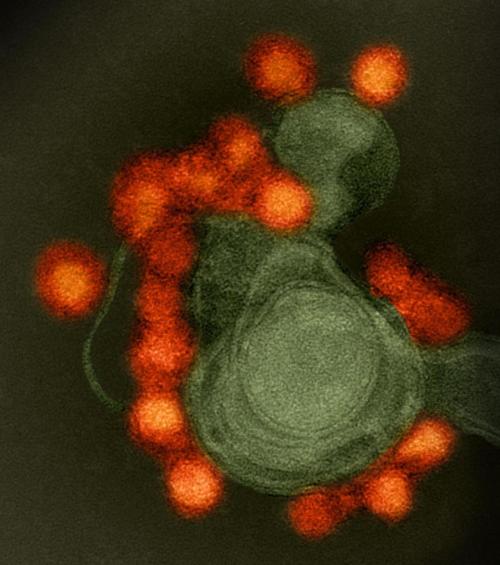Malaria drug protects fetal mice from Zika virus, NIH-funded study finds
Blocking a key placental defense may limit maternal-fetal transmission of the virus.
Hydroxychloroquine, a drug approved by the Food and Drug Administration to treat malaria and certain autoimmune diseases in pregnant women, appears to reduce transmission of Zika virus from pregnant mice to their fetuses, according to a study.

Transmission electron microscope image of negative-stained, Fortaleza-strain Zika virus (red), isolated from a microcephaly case in Brazil.
The drug works by inhibiting autophagy, a process by which cells remove toxins and recycle damaged components to generate energy. The researchers show that Zika virus may manipulate this process in the placenta to infect the developing fetus.
“Zika virus infection during pregnancy can lead to a devastating array of birth defects, including microcephaly, abnormal reflexes, epilepsy, and problems with vision, hearing and digestion,” said expert. “This study suggests that treating Zika-infected pregnancies with autophagy-inhibiting drugs may lower the risk of these abnormalities, but more research is needed to confirm these findings.”
Previous research has established that autophagy plays an important role in the placenta’s defense against bacteria and other disease-causing agents. In the current study, the researchers demonstrate that Zika virus infection activates autophagy in lab cultures of human placental cells and in the placentas of mouse models of Zika virus transmission. They then show that, when infected with Zika, pregnant mice lacking an essential autophagy gene called Atg16l1 have significantly lower levels of detectable virus and less placental and fetal damage, compared to Zika-infected pregnant mice who have the gene.
“These results led us to reason that an existing drug that blocked autophagy and could be administered during pregnancy might reduce vertical transmission of Zika virus,” said expert.
To test their hypothesis, the researchers administered hydroxychloroquine, an FDA-approved drug known to inhibit autophagy, to Zika-infected pregnant mice. Consistent with the results seen in mice who lacked the Atg16l1 gene, mice treated with hydroxychloroquine have lower levels of detectable virus in their placentas and less placental damage, compared to untreated mice. The treatment also restricts Zika infection in the fetal head and leads to a larger fetal body size, suggesting that the drug limits cross-placental transmission of the virus.
“Our findings indicate that pharmacological inhibition of autophagy warrants evaluation in preclinical studies and eventually in human trials to further define its effects on Zika congenital disease,” added expert.
Source: U.S. National Institutes of Health
- 373 reads
Human Rights
Ringing FOWPAL’s Peace Bell for the World:Nobel Peace Prize Laureates’ Visions and Actions

Protecting the World’s Cultural Diversity for a Sustainable Future

The Peace Bell Resonates at the 27th Eurasian Economic Summit

Declaration of World Day of the Power of Hope Endorsed by People in 158 Nations

Puppet Show I International Friendship Day 2020

